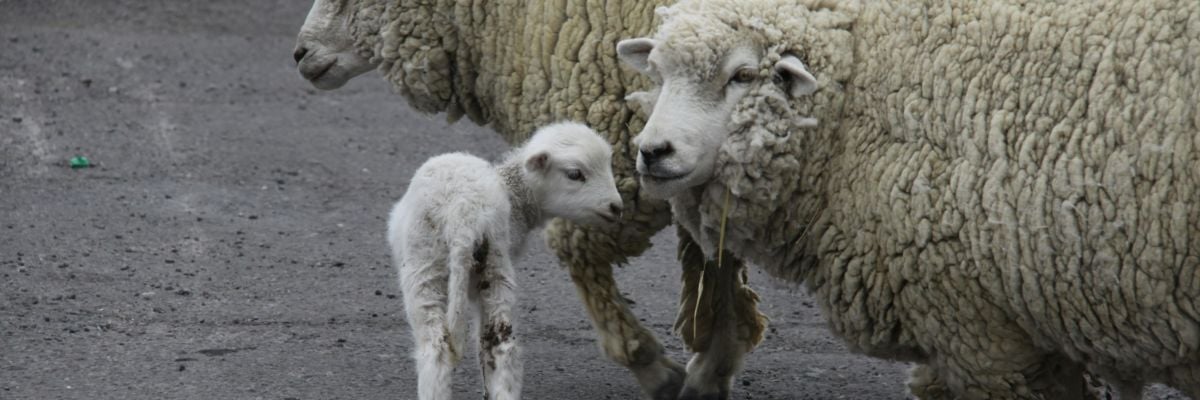
I am the good shepherd,
and I know mine and mine know me,
just as the Father knows me and I know the Father;
and I will lay down my life for the sheep.
Sophia Cavaletti, Catholic Bible scholar and founder of the Catechesis of the Good Shepherd, has a fascinating insight about the about translation of this verse. Jesus speaks about how the good shepherd lays down his life for the sheep. Usually we understand this as laying down his life in the sense of dying—that is, on the cross—for the sheep. But the Greek doesn’t necessarily have go to in that direction. Indeed, the verb titheo could mean “lay down” in the sense of “set out,” as in to set out on the table. Cavaletti then suggests that we should say the good shepherd simply gives his life for the sheep—he lays it out on the table, like at the Eucharist. This giving does, ultimately, mean his willingness to die, but the dying isn’t as determinative as the self-giving. That matches well with some of the best Catholic thinking on the cross, too: arguably, the death of Jesus is only secondary, a kind of consequence, to his giving of his life to us in this world enslaved by sin.
In fact, that is a really interesting way to think about the Eucharist.
One of the critiques in the Reformation era was that popular piety focused too much on the Real Presence and not enough on the actual reception of Holy Communion. The Articles of Religion for the Church of England famously say that the Blessed Sacrament was not instituted to be “looked at or carried about,” but to be eaten. But this has implications beyond just the Eucharist, because it’s a statement about the Incarnation. Yes, we could say Jesus was born to die, but does that mean that no other part of his life had meaning? Does that mean that the disciples should have just ignored him and minded their own business until the crucial events of Holy Week?
Obviously not. Criticisms of eucharistic adoration inevitably become criticisms of the life of Jesus, because in fact, he spent much more of his life just being with his people than he spent dying for us.
The Good Shepherd gives his life for the sheep. He gives his life, not just his death. He is with us. This is a mystery worth celebrating and observing and proclaiming. As St. John puts it today, “See what love the Father has bestowed on us that we may be called the children of God.” Again, Jesus came not just to die, but to give us life—the divine life, the fellowship of God. He came to share his divine nature with our human nature.
This is why Peter says so boldly in Acts that “there is no salvation through anyone else, nor is there any other name under heaven given to the human race by which we are to be saved.” By salvation, Peter means being freed from sin and death so that we can become the children of God, so that we can share in the life of Jesus Christ.
Modern people often hear verses like this and recoil from the apparent exclusivity of the Christian message. What’s funny about that is that so often, they do so from a kind of Christian bias. In other words, they assume Christian concepts about salvation and then naïvely imagine that other religions offer a different solution to the same problem. But Peter’s claim, and the claims of Christianity, are unique. No other religion or philosophy even claims to offer the kind of thing that Christ offers here. No other religion or philosophy sees the same problem, which salvation through Christ is meant to solve; no other religion or philosophy makes the same claims about the high calling of human nature to fellowship with God.
Of course, there are others who do things like the Good Shepherd. There are plenty of people out there who will guide us, protect us, feed us—but these “hired men” are not the shepherd, because they care for the sheep only for their own reasons, not out of love. Only Jesus gives us himself completely, without holding anything back. Salvation isn’t some kind of clever solution to a problem; it is the gift of a person. So although Peter’s “no other name” comment is exclusive, we need to understand why: there is no other name by which salvation is given, because salvation is receiving the life of Jesus. How could we receive the life of Jesus through anyone other than Jesus?
Having received this life, though, in its infinite goodness, we become capable of our own kinds of sacrifice.
Catholics are good at talking about “sacrifice,” but that doesn’t just mean losing something or killing something. When Jesus says elsewhere to “take up our cross,” we rightly hear an emphasis on suffering for his sake. But the suffering itself isn’t the point; it’s that love shows itself in the willingness to do hard things, to overcome obstacles, to undergo suffering for the sake of the beloved. So to take up our cross means, actually, to practice what we might call a “eucharistic” life, a life of giving ourselves, of our presence, of sharing our gifts.
We do this ritually at every offertory through the hands of the priest—“Receive, O Holy Trinity, this oblation which we offer unto thee.” That oblation is not merely the host and the chalice, but the “sacrifice of praise,” the living temples whose hearts are lifted up to the Lord. Yet the whole movement of the sacred liturgy is that this offering is multiplied, transformed, changed, and returned to us anew. Our offering to him becomes his offering to us, a sort of oblation that turns the old idea about sacrifice on its head. We are not here appeasing some bloodthirsty deity; we have been invited to the table as children and heirs.
So our own “offering” in the world, whether it’s sharing a meal, having a conversation, or quietly suffering in love, is less some kind of transaction adding to our account than a sharing of the abundance of God’s own table. We don’t have to act as though we are in charge of all the sheep because we know the one who is.
And sharing the gifts of the Good Shepherd, it turns out, also draws us closer to him. When we make him known in us, we better know ourselves in him.
That is maybe one of the most comforting but also annoying aspects of the “Good Shepherd” image. The shepherd, in real life, does know the sheep better than they know themselves. That’s not the most flattering place to be, on the one hand. But it’s also a reminder that, ultimately, we really are in good hands. Christ feeds us with his own life and leads us with his own Spirit. Despite what we might think, we have everything we need.



